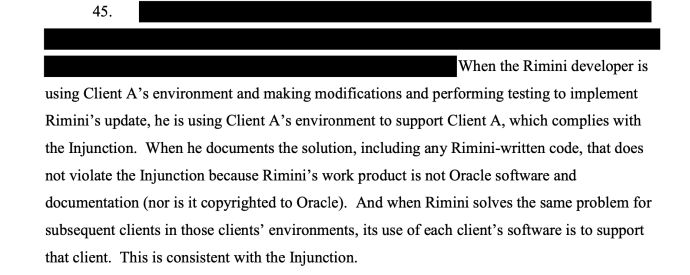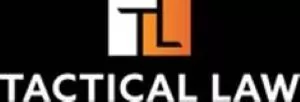Recently Rimini filed its opposition to Oracle's motion for
an order to show cause why Rimini should not be held in contempt in
the Rimini I litigation. Many of the legal arguments made by
Rimini have already been previewed in the briefing on the various
motions for summary judgment pending before the court in Rimini II.
Below are some observations of some of the key arguments for
those following the litigation and this blog.
Rimini claims that it does not host any Oracle software itself but
instead accesses the software only from siloed, client hosted and
client specific environments. Our readers may remember that
the Nevada federal court and the Ninth Circuit took issue with
Rimini's legacy support model (Process 1.0), in which Rimini
locally hosted its clients' software environments on its own
systems and used generic development environments to create
updates. Rimini contends that under Process 2.0 no copying of
Oracle code happens outside of the client's siloed and specific
environments and the client's Oracle license allows such
copying for that client. As a result, Rimini asserts that
there is no violation of the injunction in its completely new and
redesigned process. As for any objection that the code is
copied into RAM, any RAM copies created are not copyright
infringement as they are made in the client's environment,
which is fully licensed.
Rimini also asserts that the Process 2.0 was not actually
litigated in Rimini I. Rimini argues that where a redesigned
process is more than colorably different from that previously
adjudicated process, adjudication of that new process in a summary
contempt proceeding, which is what Oracle is trying to do, is not
appropriate or constitutional. In fact, Rimini filed the Rimini II
litigation for the purpose of getting a declaration from the court
that its process is legitimate and does not constitute copyright
infringement.
Another interesting Oracle argument is that Rimini can't
cross-use what it learns in one customer's environment to solve
a problem in another customer's environment. Rimini
argues that the conduct now accused by Oracle is the re-use of
Rimini's "know-how", including Rimini work product
not containing any Oracle code, gained by performing work for
Client A to perform similar work for Client B. Rimini argues
that this is not copyright infringement, but Rimini's own
knowledge that cannot be controlled by Oracle. In a heavily
redacted Declaration, Rimini's expert Professor Owen
Astrachan has this to say:

?Rimini also argues that Oracle's copyrights have not been
infringed as Rimini has not created a derivative work, which would
require that Rimini "substantially incorporate protected
material from the preexisting work." That in turn
requires that the new work be "substantially similar" to
the protected work, requiring a substantial similarity analysis,
including analytic dissection, which Rimini argues Oracle has not
done. Rimini argues that it is irrelevant that the Rimini
file, when later sent to and incorporated into a client's
PeopleSoft environment, causes that modified
environment as a whole to become a
derivative work (which is licensed and compliant with the
injunction) because that does not make the stand-alone file
(i.e., something 100% Rimini-created) a derivative
work.
Another interesting issue in the litigation that Rimini argues was
not litigated and decided in Rimini I involves the issue of cloud
hosting. In Rimini I the injunction prohibited Rimini
from reproducing, creating derivative works of, or using PeopleSoft
software or documentation on, to or from "any computer systems
other than a specific licensee's own computer
systems". This requirement is a creature of the
PeopleSoft license and not one of the exclusive rights granted by
the Copyright Act. Rimini contends that the client's
cloud account where the software is hosted by Windstream is under
the control of the client and thus is compliant with the
requirements of the PeopleSoft license, which require the software
to be hosted on the client's "computer
systems". Rimini disputes that the physical hardware in
the cloud environment needs to be owned by the client to be part of
the client's "computer systems", and instead argues
that the dispositive issue is control over the virtual environment
and not ownership of the physical hardware.
Finally, Rimini argues that it has not violated the part of the
injunction prohibiting distribution. For every single
file that Oracle alleges Rimini "distributed," Rimini
argues that Oracle does not even contend, let alone prove, that the
file contains Oracle code or is substantially similar to an Oracle
copyrighted work. Rimini also argues that Oracle
software has not been distributed as distribution under the
Copyright Act requires proof of several elements, including that
the work "changed hands" and that it was disseminated
"to the public", which Rimini claims is not the case
here.
Tactical Law will continue to monitor the case. Check
back here periodically for updates.
The content of this article is intended to provide a general guide to the subject matter. Specialist advice should be sought about your specific circumstances.

